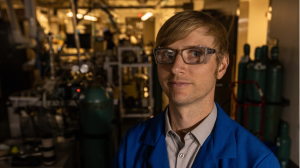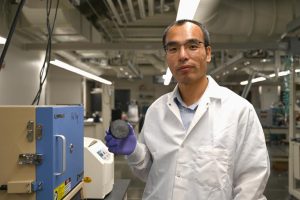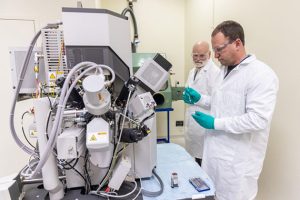
Oct. 24, 2025
Mizzou scholars spearhead multidisciplinary research on team dynamics, knowledge exchange
Here’s light-hearted take on a real doctoral retreat and how it might look as an article in a completely fictitious academic journal.

Oct. 22, 2025
Mizzou adds additive manufacturing printer to its toolbox
A significant step forward in advanced manufacturing and material science, the technology will be an asset for campus researchers and local industries.

Aug. 14, 2025
Undergrads gain hands-on experience in materials innovation
Summer research experience provided participants with opportunities to make a real-world impact.

July 30, 2025
Shining UV light on the future of computer chips
A recent study from the University of Missouri could help scientists and engineers build faster, cheaper and more eco-friendly electronics.

July 29, 2025
Opening a new chapter in sustainable lighting technologies
New materials set the stage for more efficient lighting, cleaner solar energy systems and even compact LEDs for wearable medical devices.

Nov. 22, 2024
Mizzou Engineer honored as ASME Rising Star
Hessam Yazdani, an associate professor of civil and environmental engineering at the University of Missouri, has been recognized by the American Society of Mechanical Engineers (ASME) with a certificate acknowledging his distinguished achievements in engineering mechanics.
![The multidisciplinary team consists of faculty from Mechanical Engineering (Matt Maschmann), Chemical and Biomedical Engineering (Matthias Young, Sheila Grant and David Grant) and Electrical Engineering and Computer Science (Jianlin Cheng [not pictured], James Keller, Filiz Bunyak and Prasad Calyam).](https://engineering.missouri.edu/wp-content/uploads/2024/11/DSC_4763-300x200.jpg)
Nov. 13, 2024
Accelerating materials discovery
Mizzou Engineers are partnering with Arizona State University, Brewer Science and the U.S. Army Corps of Engineers Engineer Research and Development Center (ERDC), to increase the efficiency of materials development by using artificial intelligence (AI) and machine learning (ML) to model and test new materials. Mizzou's research is supported by a $1.87 million grant, sponsored by Arizona State University.

Oct. 8, 2024
Eco-friendly firefighting
Mizzou Engineer Yingchao Yang and collaborators are developing a new biochar-based foam to reduce the use of harmful chemicals in controlling fires.

Jan. 30, 2024
Sparking innovation for research
A scanning electron microscope at the University of Missouri Research Reactor will enhance the facility’s investigative capabilities for materials research and discoveries.

Dec. 22, 2023
Mizzou Engineers advanced energy, AI, materials, transportation, health in 2023
This past year, Mizzou Engineers worked on significant solutions to society’s most-pressing challenges. They advanced nuclear power. They studied ways to turn leftover bread crust into plastics that will degrade naturally in the environment. They made artificial intelligence explain itself. They invented new materials, investigated self-driving trucks and came up with an innovative system to optimize blood supplies.